Prince Lestat and the Realms of Atlantis Read online
Page 33
This attitude was not too different from the attitudes of people today--in this very time--in which the entire world is dependent on energy technologies which the vast majority do not understand.
But I will tell you what was different.
This earlier world was an innocent world that had never known centuries of military developments or the agricultural or industrial revolutions that all today on Earth take for granted as inevitable precursors to technological advancement; and therefore these people did not labor under the immense weight of cultural or political or moral traditions from such revolutions.
Much of what I saw and heard I couldn't understand until I came awake in the twentieth century and saw the blessed affluent world of the West in this time, in which people carry enormous cultural burdens from earlier economic periods without even being aware of it. Take for example that hundreds of millions today still subscribe to an authoritarian religion inspired almost entirely by an early Mesopotamian agricultural revolution and the development of the monarchical city state that arose from it and fostered it.
Again, these ancient people were innocent of such things. They had gone from being hunter-gatherers to living in a technological paradise.
Another practical matter.
The engulfing public services of Atalantaya, the technologies of Atalantaya--were supported by a tax on every single financial exchange. But the tax was small and people had trouble understanding my questions when I asked about such things. The tax was simply part of life. And the abundance of goods and services available to everyone seemed to completely preempt any individual interest in acquiring personal wealth.
Now, there is one thing more I wish to recount before I move on to Amel. And that is simply the Festival of Meats, which gave pleasure to the city like nothing else I'd ever seen.
As I've indicated, there were six such festivals a year, and they were often referred to simply as Wilderness Festivals. They were the only time that the people of Atalantaya could eat the roasted or boiled flesh of lamb, sheep, goats, or the small fowl of that time that were similar to the chickens of today. It was also the time when fresh cheeses and cream were abundant in Atalantaya. The Festival lasted five days.
As the time drew near for it, parks and gardens everywhere were refurbished and made ready, and restaurants and cafes set extra tables and chairs outside their doors. Then the Wilderness people came flooding in, with their meats and milk and cheese to sell to the restaurants and cookshops and giant public kitchens--and suddenly the scent of roast meat was everywhere and people everywhere were buying from the makeshift booths and movable displays of the Wilderness people who offered all sorts of other goods for sale too: animal skins, feathered fans and headbands, and baskets, exotic plants in crude pots, spectacular birds in artful cages, and trained dogs of many breeds and sizes and even some domesticated cats.
In essence all the fruits of the Wilderness lands could be brought in for sale during the Festival--not just meats. And many a Wilderness family had a special tea or broth to offer, and even homemade intoxicating drinks and wines. And homemade concoctions of hallucinogenic herbs or mushrooms.
Atalantaya swarmed with the Wilderness people, and every merchant of Atalantaya was busy trading, buying crafts and skins, and selling luracastric clothing, furnishings, and gadgets to the Wilderness people as well.
Of course the talking bracelets and computers were of no use outside Atalantaya. But there were many other luracastric items for sale--from goblets and plates to spools of luracastric thread to gadgets we could not understand. Mirrors were a huge sale item, and Wilderness people apparently sold as much gold and copper jewelry from their villages as they bought from the more sophisticated jewelers and metalworkers of the city.
It was something to behold. And it was here I saw for the first time, in abundance, bound multipaged books made of luracastria, and scrolls of luracastria, and inks for writing on luracastria, and metal and feather pens. But these were highly expensive and only a very few people from the Wilderness had any interest in them. And these people, some of them, the ones who bought the books or pens, appeared to be people of authority in some capacity or at least people who commanded great respect. Looking back on it, I wonder if they were not eccentric scholars of the Wilderness or even shamans. Whatever the case, there were not very many of them.
The feasting was spectacular--much like the banquets we'd enjoyed in the Wilderness villages--except we had here every delicacy conceivable made with meat, as well as sauces of great refinement and combinations of hot spices and fruits and vegetables such as we'd never encountered before. Again, there must have been butter. But I can't remember any butter.
We ate ourselves sick during this time. Everybody did. Everybody drank freely. And people danced. They danced everywhere. Wilderness musicians were all the rage amongst the people, and the wildest music with flutes and drums echoed up the walls from every street in the city, and we danced, danced until we near collapsed in the street outside of our home building. Of course we had danced in the villages, but that was a far more limited kind of dance, often governed by the tradition of the village. This was a wild orgiastic dancing, an unbridled ecstatic dancing.
And people coupled outdoors such as I'd seldom seen in the villages. They made love in the gardens and groves, and back alleyways, and under the feasting tables. Meat, drink, dancing, public lovemaking, demonstrative lovemaking. It was the way of the Festival of Meats--of the Wilderness Festival.
Things did not always go smoothly. Some people fell down in the streets drunk and were carefully laid upon benches out of the way, or on patches of green in the parks. When fights broke out, the brawlers were surrounded and subdued and hauled off to "sleep" in the holding cells. In the main, however, things went peacefully. And we noted even some people wearing masks in the Festival and cavorting in ceremonial ways which we did not entirely understand. It had to do with deities, I thought, but not deities for whom there was any other kind of notable reverence.
But we soon came to see that there were other things going on! This was the time that Wilderness people brought their most promising children to Atalantaya to be educated, seeking acceptance in Amel's many multileveled schools. This was the time when brilliant young women and men from the villages offered their skills to the merchants and chefs of Atalantaya, or sought to sell bright and detailed paintings they had made on woven fabrics or the bark of trees. This was the time when Wilderness musicians who had made their own reed flutes, or skin-top drums or other instruments, sought to sell the instruments and themselves as skilled musicians who might work throughout Atalantaya. This was the premier time of exchange between the two worlds of Earth as they existed at this moment in history. Village healers, tellers of tales, collectors of village histories, these also came to offer services and themselves for hiring.
In all, it was a most exciting and exhilarating and inspiring time. But after the Festival was over, we were told, there would be Wilderness people not wanting to leave, who had to be rounded up and forcibly ejected from Atalantaya, and it did turn out that there was one murder or so everyone said. Amel would pronounce on the murderer, we were informed, and people did not seem eager to talk about this, or to explain anything about it, or to know anything further about it. It seemed they did not want to talk about such a distasteful and exceptional subject, and they gave us to know that murder was still common in the Wilderness lands, but not here. That surprised me. I hadn't seen murder in the Wilderness lands.
Now I want to explain one other revelation that came to us during the Festival of Meats. It concerned a small riot that broke out when one band of musicians sought to replace another band by force outside of our home building. A crowd gathered, with Atalantayans taking sides, and soon there was pushing and shoving and the verbal exchanges became furious.
At the moment when it seemed one of the musicians, the head of the usurping band, might well be harmed, certain people came out of nowhere who enforced the
peace. And I noticed that these people were all distinguished by a tiny flashing light somewhere on their persons, either on their collars, or on a wristband, or even in their hair, and that they were working in overwhelming numbers to quell the riot.
It was then that I learned how law and order really worked in Atalantaya. The entire "police force," to use our words today, was in fact composed of people going about their lives in other ways, who could be called up in an instant, to turn on their tiny flashing lights and carry out their duties as needed. These people had in fact been specially trained for this, trained on different levels, and I later found the school where they were trained. Indeed, it trained men and women to fulfill a multitude of public tasks, being what we would call today police, guardians of the peace, even civil servants. I came to see that those who broke up small fights, or took into custody the disorderly, had not been mere passersby as I had earlier thought, but members of this ever-ready police force.
But the point I'm making is, there was no standing police force, any more than there had been a standing militia in the Wilderness lands. Rather, there were countless informally undercover individuals who could at a moment's notice transform from their regular activities as scientists or musicians, or restaurant owners or shopkeepers or wandering tourists, into "the guard" needed to keep the peace. And I realized that it had been the same in the Wilderness lands. Representatives of Atalantaya had been everywhere out there, but only showing themselves when needed. I had even seen those tiny twinkling lights now and then. But it was only now, seeing them in large numbers quelling the riot, that I recognized them for what they were and became curious as to how many there were.
Well, I never found out any specific numbers on the force of guardians, or civil servants, but what I have realized since is that this highly complex world did not need a standing police force or military. And as I had nothing to compare this to, I thought it made perfect sense. But imagine if nations in the modern world took this approach--training a huge and quiet guardian force of peacekeepers who only became professional peacekeepers when needed.
After we came awake in the twentieth century, I thought of this often. And I realized something else. The world of Amel had never been equipped to fight any kind of massive attack from Bravenna--perhaps because Amel had always known that defending Earth from Bravenna was impossible. And Atalantaya had never been equipped to fight any sort of savage or barbarian assault either. Of course we never saw any savage or barbarian assault, but when I read the histories of civilizations known to the modern world, I saw a horrifying pattern: great cities built, and then sacked and burned by warriors flooding in with no other purpose than theft or the joy of massacring the population. Again and again it has played out--Egypt, Mesopotamia, Athens, Rome, ancient Kiev, even Constantinople. Well, it didn't happen in Amel's world. And why? Perhaps because the Wilderness people were never exploited or forced to do anything by Atalantaya and Amel, and all had some free access to Atalantaya and much of what it had to offer. If warlike tribes existed somewhere outside the cultural reach of Amel--and they apparently did--there was no talk of their being a concerted threat, and no fear of them among the people we encountered.
But it's now time to let Amel speak for himself through my memories.
It was a week after the Festival that our meeting with Amel occurred. We were gathered together at dawn to watch once more the seeding and growth of a large building, and after we had witnessed that spectacle with the same awe and emotion we had experienced before, someone came up to us and told us that Amel wanted to see us, and that we could have our audience with him that very day.
This was a shock. We had been pondering for some time how we might get access to Amel's factories and laboratories, and to Amel himself. And we had been divided really, about how and when to attempt this and what danger it would inevitably present if we drew attention to ourselves on account of a special interest in Amel.
And then up comes this smiling civil servant or guardian or special representative of Amel and tells us that Amel is ready to receive us, and that we best be at his personal chambers in the Creative Tower at high noon. We knew what the Creative Tower was of course. This was where Amel lived and worked and ruled. The Creative Tower was one of many buildings in the Creative Gardens, where there were laboratories and factories and libraries which we had not yet seen.
Was this the end of our stay in this paradise? Was this the end of our lives? Was this the end of our mission, and who among us wanted to lock arms and detonate and blow the magnificent and complex world of Atalantaya to high Heaven? Garekyn actually suggested that we flee. After all, it was an invitation, wasn't it? No guards had been dispatched to take us prisoner and bring us forcibly to the Great One. Why not leave the city now? We could make a report to the Bravennans of what we had seen, a progress report, so to speak, and then come back to do the deed when we were more fully prepared.
"And how do we explain to them," Derek asked, "that we are not ready now? And that we are not fully prepared?"
Suddenly they were all looking at me. And as this conversation had been taking place in our gathering room, I went out onto the balcony and stared down into the busy streets of Atalantaya. I stared up at the sky in which I could see the ghost of a daytime moon.
When I came in, I told them: "It's time for us to talk to Amel, to learn who Amel is, and what Amel is, according to Amel."
I didn't have to ask as to their disposition about our purpose. No one wanted to fulfill The Purpose. No one wanted to detonate.
Finally, Derek said in a low murmur, "I do not want to destroy all this. Even if I were ready to die, I could not bring myself to destroy all this!"
"I fear that we are supposed to persuade you," said Welf.
"No matter," I said. "Today we go to see Amel."
"And what if he knows our purpose," asked Garekyn, "and what if he's been watching us all this time? I mean why else would he be sending for us? There are millions of people around us. Why has he asked to see us?"
Finally after a lot of back-and-forth we all agreed that we were excited, much more excited than we were afraid.
V
Like everything else in Atalantaya, the Creative Tower was beautiful with great pearlescent walls, and what seemed golden floors. When I came into this time in America and in the West, a lost pilgrim from Atalantaya, I read descriptions by Christians of their Heaven as a place of golden streets and sidewalks. Well, that is how the Creative Tower was, and indeed the entire Creative Gardens were--a realm of gleaming gold paths and sidewalks.
We were taken on a long journey by those who welcomed us through broad corridors of gold, filled with light, greenery, and abundant flowers, past the open doors of huge rooms in which people were diligently at work in the most complex of environments--and it was here that we saw what might have been computer technology for the first time. And by that I mean big computers on which people appeared to be working through touch keyboards in the surfaces of tables, but what they were doing I couldn't tell. Assembling, organizing, recording information? There was no way to know.
We passed what were obviously immense laboratories, with fantastical luracastric apparatuses, and rooms of great airy cages filled with small animals from rodents to chattering monkeys and gloriously beautiful birds. There were even owls in these rooms, and the sight of these owls sent a thrill of misery through me because, of all birds on Earth, owls most resemble the people of Bravenna. I had to ask what these birds were in order to learn that they were owls. I had only glimpsed one or two in the Wilderness lands.
In the Creative Tower, there was very little evidence of metal anywhere. There was luracastria hard and soft, translucent or opaque. And there was music filling the air in different areas, streaming out of portals in the walls--with the sound of singing and instruments, and what might have been stringed instruments of great sophistication though I didn't know it, of course, at the time.
As we walked on and on through these c
orridors, slowly, past door after door, I came to realize that those leading us were deliberately taking us on a tour. In fact, after we had covered more than one story of this interesting building, I came to see that we were being invited silently to observe many communities of workers in different capacities, and also areas where the workers ate and drank and welcomed us with cheerful waves and invitations to join them.
I will regret forever that I did not ask questions, that I did not ask to see libraries and archives, that I did not ask about those tapping on the tabletops before giant monitors, that I didn't ask about everything. But at the time, I was too intrigued and too aware of my burden as the leader of our small band, the one who could actually give the signal to bring this entire world to an end.
What I did receive was the impression of immense complexity and innovation and that a great divide separated those within this building from those without. I knew no one in Atalantaya worked more than four hours a day, I'd learned that on arrival, but I had not dreamt that a technocrat class of such size had been living in the Creative Tower, and that is what I did see on this tour.
Finally we were brought to the very top floor of this tower and through a pair of large gold-plated doors heavily carved with figures and pictographs--into the receiving room of the Great One, Amel.
He sat behind a large translucent desk with his back to a transparent wall, and through that broad expanse of western-facing wall we saw that we were now at the highest point in Atalantaya, with a thousand gardened rooftops spread out in all directions below.
As for the chamber, its gold polished floors were strewn with thick woven carpets, and a grouping of couches and chairs made a cozy and comfortable space for people to sit before the desk.
The welcoming guides left us. The doors were shut.

 Interview with the Vampire
Interview with the Vampire Christ the Lord: Out of Egypt
Christ the Lord: Out of Egypt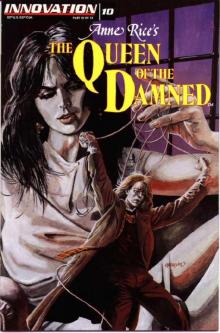 The Queen Of The Damned
The Queen Of The Damned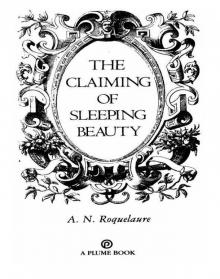 The Claiming of Sleeping Beauty
The Claiming of Sleeping Beauty Prince Lestat
Prince Lestat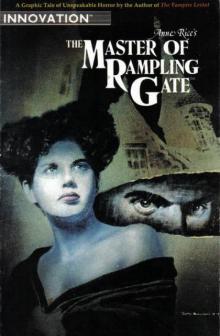 The Master of Rampling Gate
The Master of Rampling Gate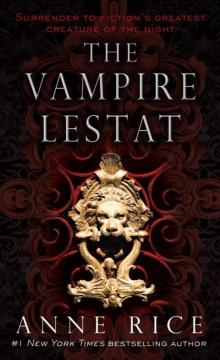 The Vampire Lestat
The Vampire Lestat Blood Canticle
Blood Canticle Beauty's Release
Beauty's Release Pandora
Pandora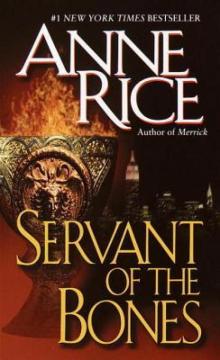 Servant of the Bones
Servant of the Bones Of Love and Evil
Of Love and Evil Beauty's Punishment
Beauty's Punishment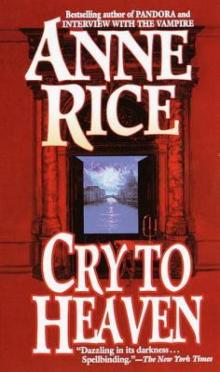 Cry to Heaven
Cry to Heaven The Tale of the Body Thief
The Tale of the Body Thief The Witching Hour
The Witching Hour Memnoch the Devil
Memnoch the Devil Blackwood Farm
Blackwood Farm Beauty's Kingdom
Beauty's Kingdom Belinda
Belinda Lasher
Lasher Vittorio, the Vampire
Vittorio, the Vampire Angel Time
Angel Time Called Out of Darkness: A Spiritual Confession
Called Out of Darkness: A Spiritual Confession Blood And Gold
Blood And Gold The Passion of Cleopatra
The Passion of Cleopatra Taltos
Taltos Exit to Eden
Exit to Eden Blood Communion (The Vampire Chronicles #13)
Blood Communion (The Vampire Chronicles #13) The Wolf Gift
The Wolf Gift The Wolves of Midwinter
The Wolves of Midwinter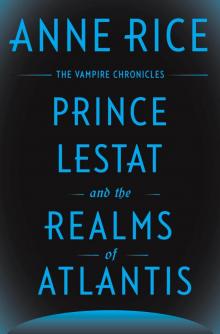 Prince Lestat and the Realms of Atlantis
Prince Lestat and the Realms of Atlantis The Ultimate Undead
The Ultimate Undead The Vampire Lestat tvc-2
The Vampire Lestat tvc-2 The Road to Cana
The Road to Cana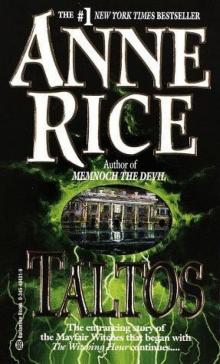 Taltos lotmw-3
Taltos lotmw-3 Merrick tvc-7
Merrick tvc-7 Called Out of Darkness
Called Out of Darkness Pandora - New Vampires 01
Pandora - New Vampires 01 Bllod and Gold
Bllod and Gold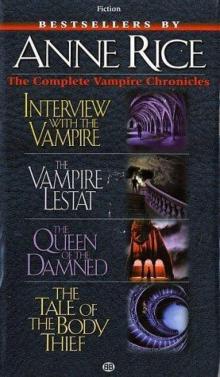 The Queen Of the Damned: Vampire Chronicles
The Queen Of the Damned: Vampire Chronicles The Sleeping Beauty Trilogy
The Sleeping Beauty Trilogy The Claiming of Sleeping Beauty b-1
The Claiming of Sleeping Beauty b-1 Lasher lotmw-2
Lasher lotmw-2 The Tale of the Body Thief tvc-4
The Tale of the Body Thief tvc-4 The Vampire Chronicles Collection
The Vampire Chronicles Collection Ramses the Damned
Ramses the Damned The Mummy - or Ramses the Damned
The Mummy - or Ramses the Damned Vittorio, The Vampire - New Vampires 02
Vittorio, The Vampire - New Vampires 02 The Vampire Armand tvc-6
The Vampire Armand tvc-6 Queen of the Damned tvc-3
Queen of the Damned tvc-3 The witching hour lotmw-1
The witching hour lotmw-1 Feast of All Saints
Feast of All Saints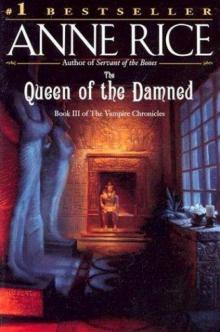 Queen of the Damned
Queen of the Damned The Wolves of Midwinter twgc-2
The Wolves of Midwinter twgc-2 The Mummy
The Mummy Blood and Gold tvc-8
Blood and Gold tvc-8 Blood Communion
Blood Communion Interview with the Vampire tvc-1
Interview with the Vampire tvc-1 Prince Lestat: The Vampire Chronicles
Prince Lestat: The Vampire Chronicles